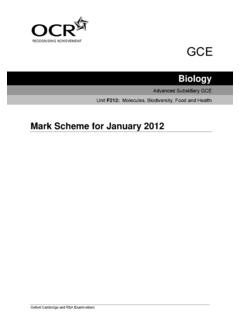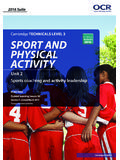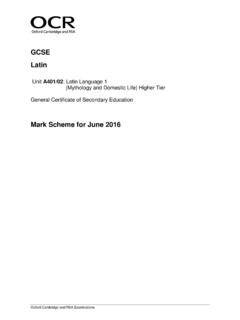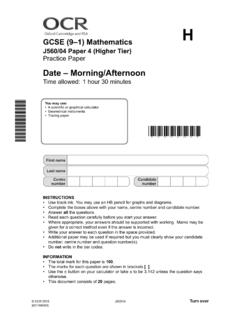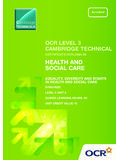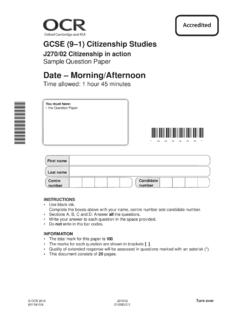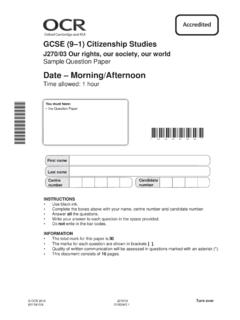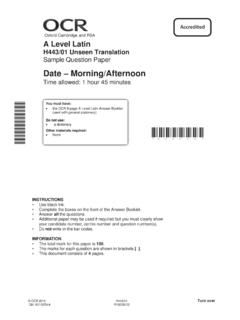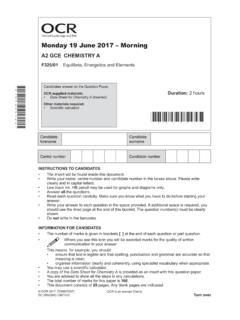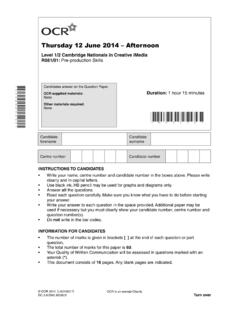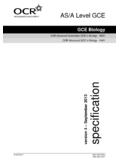Transcription of Mark Scheme for the Units June 2009 - OCR
1 GCE. biology advanced GCE A2 H421. advanced subsidiary GCE AS H021. Mark Scheme for the Units june 2009. H021/H421/MS/R/09. Oxford Cambridge and RSA Examinations OCR (Oxford Cambridge and RSA) is a leading UK awarding body, providing a wide range of qualifications to meet the needs of pupils of all ages and abilities. OCR qualifications include AS/A Levels, GCSEs, OCR Nationals, Key Skills, Entry Level qualifications, NVQs and vocational qualifications in areas such as IT, business, languages, teaching/training, administration and secretarial skills. It is also responsible for developing new syllabuses to meet national requirements and the needs of students and teachers. OCR is a not-for-profit organisation; any surplus made is invested back into the establishment to help towards the development of qualifications and support which keep pace with the changing needs of today's society. This mark Scheme is published as an aid to teachers and students, to indicate the requirements of the examination.
2 It shows the basis on which marks were awarded by Examiners. It does not indicate the details of the discussions which took place at an Examiners' meeting before marking commenced. All Examiners are instructed that alternative correct answers and unexpected approaches in candidates' scripts must be given marks that fairly reflect the relevant knowledge and skills demonstrated. Mark schemes should be read in conjunction with the published question papers and the Report on the Examination. OCR will not enter into any discussion or correspondence in connection with this mark Scheme . OCR 2009. Any enquiries about publications should be addressed to: OCR Publications PO Box 5050. Annesley NOTTINGHAM. NG15 0DL. Telephone: 0870 770 6622. Facsimile: 01223 552610. E-mail: CONTENTS. advanced GCE biology (H421). advanced subsidiary GCE biology (H021). MARK schemes FOR THE Units . unit /Content Page F211 Cells, Exchange and Transport 1.
3 F212 Molecules, Biodiversity, Food and Health 11. Grade Thresholds 30. F211 Mark Scheme june 2009. F211 Cells, Exchange and Transport Question Expected Answers marks Additional Guidance 1 (a) (i) goblet / mucus (secreting) cell ; DO NOT ACCEPT globlet'. ciliated (epithelium) ; DO NOT ACCEPT cilia cell' ciliate'. 2. 1 (a) (ii) (A / goblet cells) release mucus / AW ; ACCEPT release / creates / produces / secretes DO NOT ACCEPT excrete (mucus) traps, dust / particles / named particle ;. ACCEPT bacteria / microorganisms / pathogens ciliated cell / B / cilia, wave / waft / move, mucus ; IGNORE dirt / germs DO NOT ACCEPT combines with'. to, top of trachea / back of mouth / AW ; ACCEPT hair like projections'. DO NOT ACCEPT hairs'. Idea of up and out of lungs 3 max 1 (a) (iii) to constrict the bronchus / AW ; example of AW reduce diameter of bronchus DO NOT ACCEPT ref to increasing diameter' (note: if increase and decrease diameter' is used do not allow mark as it is contradiction).
4 ACCEPT airways'. 1 ACCEPT control flow of air'. 1. F211 Mark Scheme june 2009. Question Expected Answers marks Additional Guidance 1 (b) (i) short, distance / path / AW ; DO NOT ACCEPT ref to number of cells / cell thickness or short space (so that) diffusion / concentration, gradient is, high / steep ; DO NOT ACCEPT short gradient high rate of, (gas) exchange / diffusion ; ACCEPT high rate of movement of named gas in correct direction ACCEPT rapid' / fast / quick ACCEPT ref to efficient, gas exchange / diffusion 2 max DO NOT ACCEPT gas exchange occurs more easily'. (b) (ii) recoil / expel air / prevent bursting ; ACCEPT exhale more completely / force air out DO NOT ACCEPT exhale' (if used alone). DO NOT ACCEPT contract'. DO NOT ACCEPT stretch' on its own DO NOT ACCEPT if response includes any ref to bronchus or smooth muscle 1. Total 9. 2. F211 Mark Scheme june 2009. Question Expected Answers marks Additional Guidance 2 (a) (i) D cholesterol.
5 E protein / glycoprotein / intrinsic protein / protein channel / ACCEPT polypeptide chain protein pump / transport protein / carrier protein ; DO NOT ACCEPT amino acid chain DO NOT ACCEPT extrinsic protein F phospholipid (bilayer) / phospholipid head ; 3 DO NOT ACCEPT lipids / bilayer 2 (a) (ii) mark independently of (a)(i) NO ecf D stabilise the membrane OR maintain / affect / control / AW, DO NOT ACCEPT refs to rigidity / support / strength fluidity OR reduces permeability to, polar / charged, ACCEPT reduces / affects, lateral movement of particles ; phospholipids E allow communication across membrane OR allow, polar / ACCEPT cell recognition / receptor site / cell signalling charged, particles to pass through membrane ; / cell attachment F to act as a barrier (to, polar / charged, particles) / select ACCEPT (acts as) selectively permeable or partially what enters or leaves cell ; permeable membrane ACCEPT allows small / fat soluble molecules to pass through 3 DO NOT ACCEPT separates inside from outside 2 (b) (i) communication between cells / AW ; ACCEPT example to illustrate the point, action of hormone / cytokines cell, recognition / identification.
6 Cells work together / coordination between action of different cells ; 2 max to trigger, response / reaction ( inside the cell) ;. 2 (b) (ii) (receptor) specific shape / described ; ACCEPT tertiary structure DO NOT ACCEPT ref to active site complementary to (shape of), trigger / named trigger / ACCEPT fits / idea of lock & key in correct context communicating ; DO NOT ACCEPT matches'. molecule ; DO NOT ALLOW joins / bonds / links / combines / fits (trigger / AW) binds / attaches to receptor ; 2 max 3. F211 Mark Scheme june 2009. Question Expected Answers marks Additional Guidance 2 (c) (i) cell surface / plasma, membrane damaged ; ACCEPT description of damage proteins denatured / phospholipids separate / bilayer melts DO NOT ACCEPT bilayer becomes more fluid'. DO NOT ACCEPT cell membrane' unqualified pigment, released / leaks out ; ACCEPT cell contents' for pigment pigment, absorbs / takes up, the light ; DO NOT ACCEPT no light transmitted' solution is 2 max opaque'.
7 2 (c) (ii) Mark first response on each numbered line. Only return to extra points on first or second line if no response in line two or three more samples at each temperature ; ACCEPT repeats ACCEPT collect average / mean results same / fixed, volume of water ;. all samples same, size / surface area ; DO NOT ACCEPT mass ref to further cutting to increase surface area ; ACCEPT any method of cutting to provide larger surface area pieces, rinsed / blotted, after cutting ;. more (intermediate) temperatures ; ACCEPT list of figures of additional temps between 0- 100. DO NOT ACCEPT wider range of temperatures / more same beetroot used / same part of beetroot used ; evenly spaced temperatures DO NOT ACCEPT leave for longer 3 max DO NOT ACCEPT idea of control Total 15. 4. F211 Mark Scheme june 2009. Question Expected Answers marks Additional Guidance 3 (a) transpiration ;. xylem ;. osmosis ; DO NOT ACCEPT diffusion' alone ACCEPT diffusion with osmosis used as qualification stoma(ta) / stomatal pore ; 4 DO NOT ACCEPT pore' or guard cells'.
8 3 (b) (i) stomata (open to) allow, gaseous exchange / carbon dioxide in / look for reverse argument oxygen out / AW ; DO NOT ACCEPT ref to air OR to get gases OR let gases in ACCEPT gases in and out'. (gaseous exchange) for photosynthesis ;. (photosynthesis) essential for plant to, gain energy / make sugars ;. some water lost through cuticle ; 2 max (b) (ii) xerophyte ; 1 DO NOT ACCEPT cactus 5. F211 Mark Scheme june 2009. Question Expected Answers marks Additional Guidance (b) (iii) Allow the first point once as further explanation for A1 A4 in MARK FIRST TWO ADAPTATIONS ONLY. addition to the linked explanation: ALLOW max 2 for adaptation [A] marks reduce water (vapour) potential gradient / diffusion gradient ;. Explanation must be linked to an appropriate [A 1] hairy leaves ; statement of adaptation. Allow an explanation mark trap water vapour / moisture ; even if adaptation mark not awarded.
9 [A 2] stomata, in pits / sunken ; DO NOT ACCEPT water' for water vapour'. pits trap, water vapour / moisture ; throughout DO NOT ACCEPT transpiration' for diffusion of water [A 3] rolled leaves / presence of hinge cells ; vapour throughout reduce surface area OR (rolled leaves) trap water vapour / DO NOT ACCEPT surface area to volume ratio moisture ;. [A 4] high solute concentration in cells ;. reduces water potential inside leaf cells ;. [A 5] thick(er) cuticle ;. (which is) waterproof / (relatively) impermeable ;. [A 6] small leaves / needles ; ACCEPT spines'. smaller surface area ; DO NOT ACCEPT surface area to volume ratio [A 7] fewer stomata ;. reduces diffusion (of water vapour) ;. [A 8] stomata close, during the day ;. reduces diffusion (of water vapour) ;. [A 9] most stomata on lower surface ;. less exposure to sun OR cooler OR reduces diffusion (of water vapour) ;. 6. F211 Mark Scheme june 2009.
10 Question Expected Answers marks Additional Guidance [A 10] more densely packed spongy mesophyll ; Use three terms from: smaller surface area for evaporation (from mesophyll cell surface) ; cuticle, impermeable, water vapour, potential gradient, 4 max diffuse / diffusion, stoma(ta), needles, surface area, hinge cells, saturated QWC - technical terms used appropriately and spelt correctly ;. 1 5 max Total 12. 7. F211 Mark Scheme june 2009. Question Expected Answers marks Additional Guidance 4 (a). prokaryotic eukaryotic as chromosomes / chromatin DO NOT ACCEPT chromatid OR. (genetic material) associated with, proteins / histones ;. (diameter of cell) 20 40 m ;. Figures must have correct Units ACCEPT any figure(s) in range 10 100 m (ribosomes) 18nm ;. ACCEPT any figure(s) in range 10 20 nm ACCEPT 70 S. cell wall (present) ; DO NOT ACCEPT sometimes or usually present 4. (b) (i) flagellum / cilium / microtubule / microfilament / undulipodium ; 1 ACCEPT plurals 4 (b) (ii) (movement inside cells of).
